Before you head out to camp on the beach, it’s important to know whether it’s allowed. Beach camping rules differ depending on the location, and breaking them can lead to penalties or being forced to leave. In this article, we’ll cover the basics of beach camping laws and what you should know before setting up your tent to ensure a hassle-free experience.
Table of Contents
Is it Legal to Camp and sleep on the Beach?
Camping on the beach can be legal in some areas, but rules vary by location. Restrictions, permits, or private property may affect where you can camp. Let’s find out Can you pitch a tent and sleep on the beach or not?
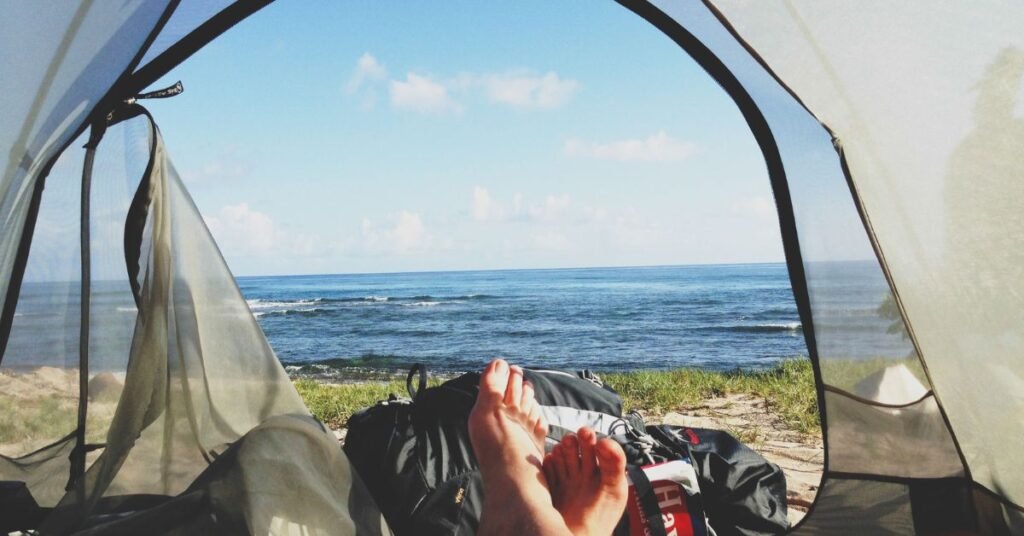
Overview of Regulations by Region or Country
You might be dreaming of pitching your tent right next to the waves, but hold on—before you get too excited, you need to know that beach camping isn’t always as simple as it seems. Different regions, even different countries, have their own set of rules. In some places, beach camping is encouraged and embraced, while in others, it’s strictly prohibited. In the U.S., for example, some state parks allow it, but many public beaches don’t. And if you’re dreaming of falling asleep under the stars in Europe, countries like France or Italy often have strict no-camping laws on their shorelines.
In Australia, some beaches are a paradise for campers, but even there, you can’t just set up camp wherever you please.
So, the first rule is to do your research because every beach has its particular laws and regulations, and you want to be sure you’re not violating any local laws.
Public vs. Private Beaches: What You Need to Know
Here’s where things get a little tricky. Public beaches are often the go-to for campers, but even then, you need to be careful. Many public beaches have designated camping spots, while others don’t completely allow overnight stays.
It’s not about the beach being public—it’s about what the local government allows.
On the other side, private beaches are a whole different story. If you don’t have permission from the owner, it’s a big no-go. Imagine setting up your tent and being asked to leave in the middle of the night! It can ruin your whole adventure.
You see, public vs. private isn’t just a simple distinction; it can mean the difference between a peaceful night’s sleep and an unexpected disruption.
How do you find out if Beach Camping is permitted?
Now, you’re probably wondering, “Okay, but how do I actually know where I can camp?” It’s easier than you might think. A quick online search can give you answers, but don’t just rely on forums or hearsay. You have to check official sources, like the local government’s website or the managing authority for that beach. National parks and wildlife services often have up-to-date information about where you can camp legally.
Another great way is to call the local ranger station or tourism office. They know the area inside and out, and they’ll tell you exactly what’s allowed. Plus, they might share some insider tips on the best spots!
Permit Requirements and Where to Obtain Them
Yes, you might need a permit! I know it sounds like a hassle, but it’s actually not that bad. In many cases, permits are super easy to obtain online or at the local ranger station. And believe me, the small fee you might have to pay is worth avoiding a heavy fine later.
Some places even require advance booking, especially in high-traffic areas, so it’s always a good idea to plan ahead.
Getting a permit not only ensures you’re camping legally, but it also helps protect these beautiful beaches by regulating who can camp and where authorities can keep these areas unspoiled for generations to come. And that’s something we can all get behind, right?
Are pitching a tent on the beach is a good idea?
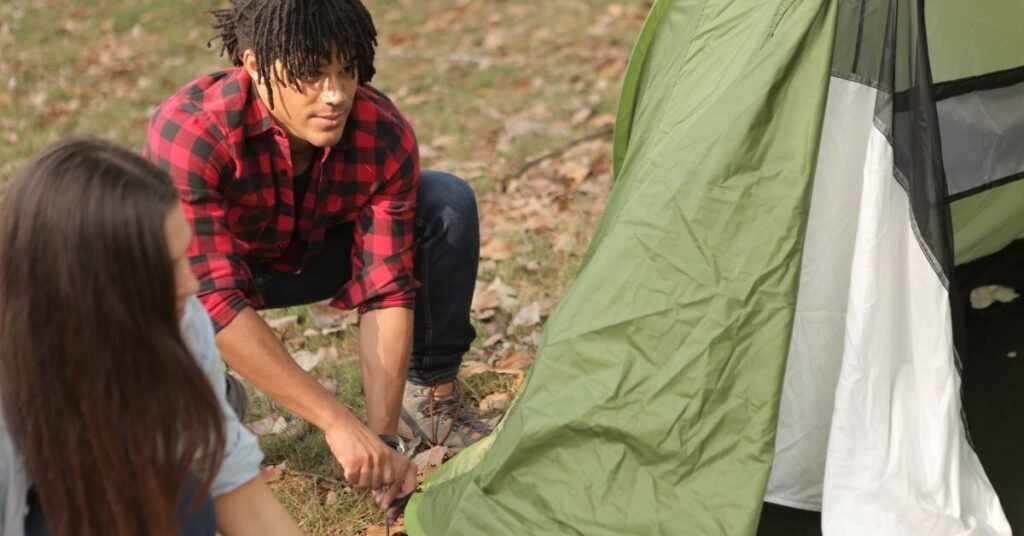
It sounds like a dream, doesn’t it? The ocean breeze, the sound of waves soothing you to sleep, and waking up to a breathtaking sunrise over the water. But is pitching a tent on the beach really a good idea? Well, it depends on how prepared you are.
At first glance, it feels like pure paradise. And for many, it truly is. Imagine being that close to nature—sand beneath your feet, stars above your head, and the endless horizon in front of you. The beach is a unique environment, and camping there can give you an unforgettable experience, one that connects you deeply with the earth and sea.
But here’s the thing: beach camping can also throw some unexpected challenges your way. Let’s talk about them.
The Wind Factor
Beaches are windy, sometimes very windy. If your tent isn’t well-secured, you could end up chasing it down the shore. Not exactly the relaxing vibe you were hoping for, right? You’ll need sturdy stakes and maybe even sandbags to keep everything in place. Sure, it takes a bit more effort, but if you’re prepared, it’s totally worth it.
The Sand Problem
Ah, the sand. It gets everywhere. And I mean everywhere! You’ll feel it in your clothes, your tent, your food...
You get the picture. While it sounds like a small inconvenience, it can be frustrating. But on the other side, there’s something kind of freeing about getting a little messy and embracing the raw elements of nature. It’s a trade-off you’ll need to decide if you’re willing to make.
The Tide Worry
Here’s a big one: tides. Setting up your tent too close to the water could lead to a midnight surprise when the tide rolls in. It’s essential to check the tide schedule and pick your camping spot carefully, far enough from the waterline.
The last thing I want when I am on a camping trip is to wake up with water flooding my tent!
Serenity at its Best
But despite these challenges, let’s not forget why you’re considering beach camping in the first place. The peace. The pure, undisturbed connection to nature. There’s something about the sound of waves crashing in the background that just melts your stress away. And waking up to the smell of saltwater and the sight of the sun rising? That’s something you don’t get from your regular campground.
So, is pitching a tent on the beach a good idea? Absolutely! But only if you’re prepared for the realities of beach camping. With the right gear, awareness of the tides, and a little patience, it can be an extraordinary experience. One that sticks with you long after you’ve packed up your tent and shaken the last bit of sand from your shoes.
You’ll never look at the beach the same way again.
Supplies you need for beach camping?
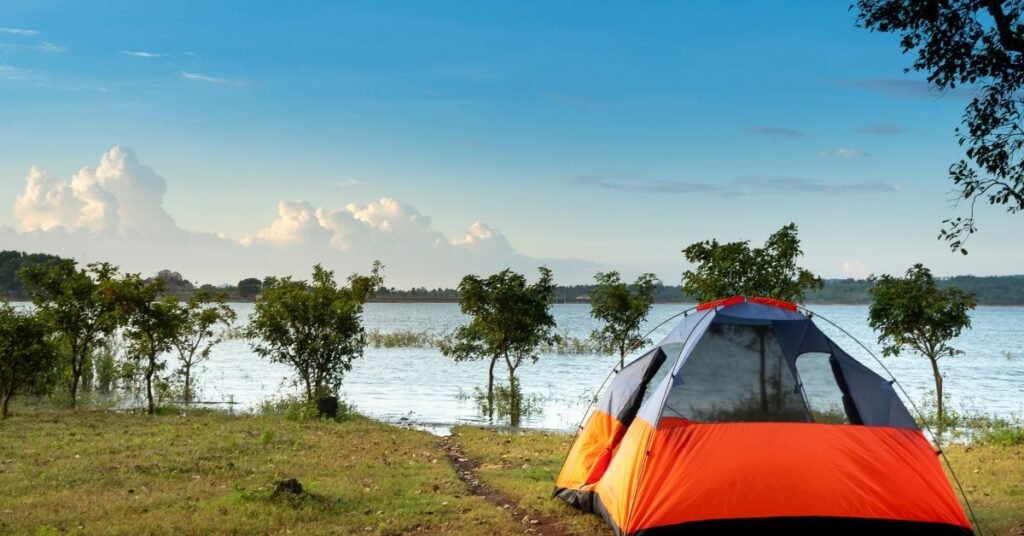
When you think about beach camping, you probably imagine sun, sand, and waves. But before you throw your tent in the car and head out, there’s something crucial to consider: the supplies. Being well-prepared can make the difference between a dreamy escape and a sandy disaster. Let’s dive into the essential gear that’ll make your beach camping trip unforgettable—in the best possible way!
Sand-Specific Tent Stakes
One of the first things you’ll notice about beach camping is how tricky it can be to secure your tent. Regular stakes just won’t cut it in loose sand. What you really need are sand-specific tent stakes. These are longer and wider, designed to anchor your tent securely, even when those ocean breezes kick up. Without them, you’ll spend the night worrying about your tent flying off into the sunset—not ideal, right?

A Reliable Tent with Good Ventilation
You might think any tent will do, but when it comes to beach camping, ventilation is key. You’re going to want a tent that lets that refreshing sea breeze flow through, while also protecting you from the occasional gust of wind or blowing sand. A reliable, wind-resistant tent with mesh windows will keep you cool and comfortable while giving you a break from the sun when you need it.
Sand-Proof Gear (Bags, Blankets, and Mats)
Let’s talk about sand for a second. It’s beautiful to look at, but it can also be a bit of a pain. It gets everywhere! So having sand-proof gear is a game changer. Sand-proof beach blankets and mats will give you a comfortable, grit-free area to lounge on. And don’t forget a sand-proof bag to keep your essentials—like electronics or snacks—safe from the raid of those tiny grains. Trust me, once sand gets into your stuff, it’s hard to get rid of.
Sun Protection (Sunscreen, Hats, Sunglasses, and a Shade Tent)
The beach can be scorching, especially during the day. Sunscreen is an absolute must—don’t skimp on it! Go for SPF 50 or higher, and make sure it’s water-resistant. Throw in a wide-brimmed hat and a good pair of sunglasses to protect your eyes from that glaring sun. While your tent can provide shade, you might want to bring along a separate shade canopy or sun shelter for lounging during the day without retreating to your tent.
Make sure you will wear sunscreen also in the night.
Cooking Gear and a Portable Stove
One of the joys of camping is cooking under the stars, but remember, most beaches won’t allow open fires. That means you’ll need a portable stove or grill to cook your meals. A compact camping stove works great, and be sure to pack a few lightweight pots and pans that are easy to clean. Also, keep your food stored in airtight containers—seagulls are crafty little creatures when it comes to scavenging for snacks!
Waterproof Dry Bags
When you’re camping so close to the water, having dry bags for your valuables is a lifesaver. You can toss your phone, camera, clothes, and anything else you don’t want to get wet into these bags, and they’ll stay perfectly dry, even if you get hit by a rogue wave.
Plus, they’ll keep the sand out too. A win-win.
Tide Schedule and Flashlight
Before you settle in for the night, it’s critical to check the tide schedule. You want to make sure your tent is set up far enough from the water’s edge, so you don’t wake up to an unexpected tide creeping into your camp. And don’t forget a flashlight or headlamp! Once the sun sets, it gets dark fast on the beach, and you’ll want to be able to navigate around your campsite safely.
Plenty of Water and Hydration Gear
Don’t be fooled by the cool ocean breeze—you’re still at risk of dehydration. Between the heat, sun, and physical activity, you’ll need to stay well-hydrated. Bring plenty of fresh water and a good insulated water bottle to keep your drinks cool. Dehydration can sneak up on you, especially with the sun reflecting off the sand and water.
Beach Chairs or Hammock
You didn’t come all this way just to sit on the ground the whole time, did you? A lightweight beach chair or a portable hammock is a great addition to your gear. You’ll thank yourself when you’re lounging comfortably, watching the waves roll in, rather than getting sand in your shorts.
Bug Spray and First Aid Kit
Don’t let the ocean breeze fool you—there can still be bugs at the beach. Pack bug spray to keep the pests away, especially in the evenings. And no camping trip is complete without a first aid kit. Cuts, scrapes, and even sunburn can happen, so it’s always smart to be prepared.
Beach Camping Tips for a Safe and Enjoyable Camp Memory
Every camping trip requires some planning to ensure it’s safe and enjoyable. Here are some essential tips to help you create beach camping memories you’ll cherish for a lifetime.
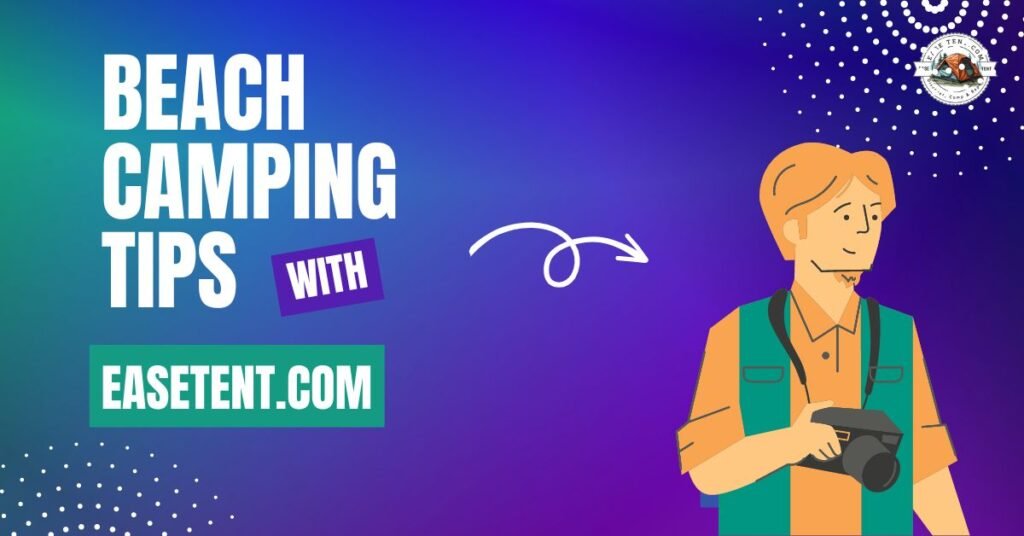
Choose the Right Spot: Be Mindful of the Tide (Sea flow)
First and foremost, be aware of the tides. Setting up camp too close to the water might seem like a great idea until the tide comes in during the middle of the night and floods your tent! Before you even pitch your tent, check the tide charts for the area. Pick a spot far enough from the water’s edge, ideally above the high-tide mark. You’ll avoid any surprises, and your gear will stay dry and safe.
Anchor Your Tent Securely
One thing about the beach—there’s no shortage of wind! While the breeze can feel refreshing, it can also send an improperly secured tent flying. Use sand-specific tent stakes that dig deep and secure your shelter. If you’re still worried about the wind, weigh down your tent with sandbags or heavy items like coolers or rocks. A sturdy tent not only gives you peace of mind but also prevents any unexpected middle-of-the-night tent collapses!
Pack Plenty of Water
It’s easy to forget how much water you’ll need when you’re surrounded by the ocean, but don’t be fooled—there’s no drinking water in sight! You’ll need to pack more water than you think for both drinking and cooking. Dehydration can sneak up on you, especially when you’re spending the day in the sun. Bring enough fresh water for everyone in your group and keep sipping throughout the day to stay hydrated.
Protect Yourself from the Sun
Beach camping means long hours under the sun, so be prepared to protect yourself. Pack plenty of sunscreen with a high SPF, and reapply it often—especially after swimming or sweating. A wide-brimmed hat and sunglasses are lifesavers for keeping the sun off your face and out of your eyes. Set up a shade tent or canopy so you have a cool place to relax during the hottest parts of the day. Believe me, you’ll thank yourself when the sun is beating down!
Respect Wildlife and the Environment
Beaches are home to many types of wildlife, from nesting birds to crabs and other marine creatures. Always follow the “leave no trace” principle: clean up after yourself, avoid disturbing wildlife, and take all your trash with you. This respect keeps the beach pristine and ensures that future campers can enjoy the same beauty you did. Plus, you don’t want curious animals rummaging through your camp looking for food!
Build a Fire Safely (Or Use a Portable Stove)
Before lighting a campfire on the beach, check local regulations. Many beaches disallow fires due to environmental concerns or wildfire risk. If fires are allowed, build your fire well away from any vegetation and make sure to put it out completely before going to bed. Use sand and water to extinguish it thoroughly. If fires are not permitted, a portable camping stove is a fantastic alternative for cooking your meals and boiling water safely.
Check the Weather Forecast
Beach weather can change quickly. What starts as a sunny day can turn into a stormy evening, so always check the weather forecast before heading out. If high winds or storms are predicted, you might want to reschedule your trip. Camping in the rain is one thing, but camping through a beach storm is dangerous and far from enjoyable.
Bring Bug Spray
You might not associate the beach with bugs, but mosquitoes, flies, and sand fleas can be a real nuisance—especially near dunes or marshy areas. Bug spray is a must to keep the little critters from ruining your evening. Citronella candles can also help create a bug-free zone around your campsite. There’s nothing worse than trying to sleep with itchy bites, so come prepared!
Pack Light, but Don’t Forget Essentials
Beach camping can be tough when you’re lugging gear across the sand, so packing light is key. But make sure you don’t leave behind the essentials, like sunblock, first aid supplies, a flashlight or headlamp, and extra batteries. A compact camping chair or hammock can also be a lifesaver when you want to kick back and relax without getting sand everywhere.
What to Expect While Sleeping on the Beach (Night Experience of the Beach)
Sleeping on the beach sounds like pure bliss, right? But as dreamy as it may sound, there are a few things you should be ready for. Let’s dive into what you can expect when you decide to sleep on the beach.
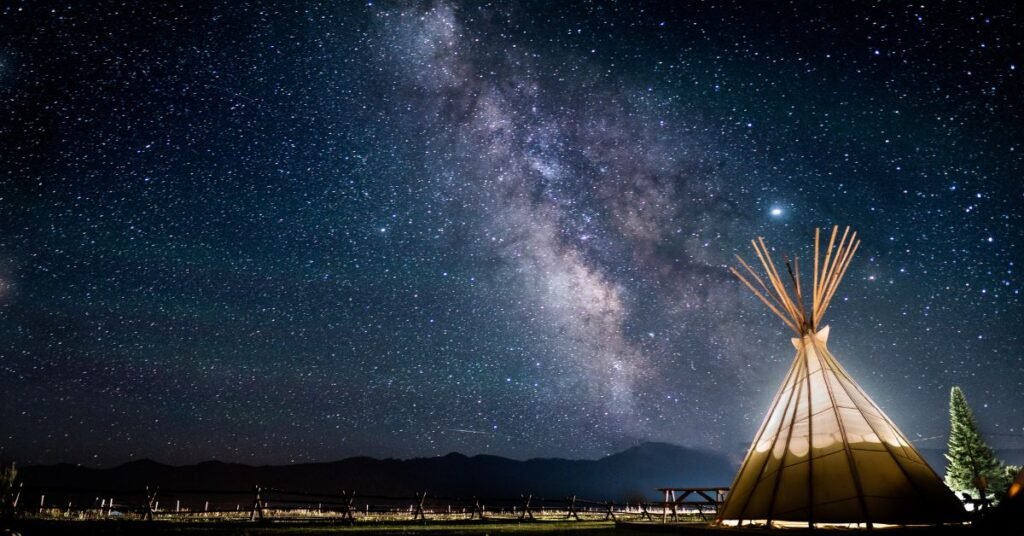
The Sound of the Ocean: Soothing or Overwhelming?
One of the biggest draws to beach camping is the sound of the waves crashing. It can be incredibly calming, almost like nature’s cradle song.
For me and many, it’s the perfect soundtrack for falling asleep. But keep in mind, that the ocean isn’t always gentle. Sometimes, those waves are louder than you’d expect, especially on a windy night or if you’re close to the shoreline. If you’re a light sleeper, the constant noise might be more overwhelming than relaxing. You might want to bring earplugs just in case the ocean turns up the volume.
Temperature Changes: Hot by Day, Cool by Night
Beaches are infamous for temperature swings. During the day, it can be hot and sunny, but once the sun goes down, the temperature often drops—sometimes significantly. You might start out in just a t-shirt and shorts, but by the middle of the night, you’ll be glad you packed a warm hoodie or sleeping bag. Prepare for both extremes by bringing layers, so you can stay comfortable no matter what the beach throws at you.
Wind: A Blessing and a Curse
That ocean breeze? It can be amazing, keeping you cool on a warm night. But the wind can also be strong, especially if you’re camping in an exposed area. Gusts of wind can kick up sand and make it harder to sleep. Make sure your tent is securely fastened, or if you’re sleeping under the stars, have something like a windbreaker or a blanket to protect you from the breeze.
Waking up with sand in your hair might sound romantic until it’s actually happening.
The Beauty of the Stars
One of the most magical parts of sleeping on the beach is the view above. With little to no light pollution, the night sky can be breathtaking. You’ll see more stars than you ever thought possible, and if you’re lucky, you might even catch a shooting star. It’s the kind of sight that makes you feel connected to the world in a way that’s hard to describe. If you enjoy stargazing, bring a blanket or reclining chair, and spend some time simply soaking in the beauty of the universe.
Sand: It’s Everywhere
You can’t escape it—sand will get everywhere. It’ll sneak into your tent, your sleeping bag, your clothes, and even your food if you’re not careful. While you can’t fully avoid sand when sleeping on the beach, you can minimize the discomfort by bringing a sand-proof mat or blanket to sleep on. Shake out your clothes and sleeping gear regularly to keep sand buildup to a minimum, and accept that a little grit is part of the adventure.
Bugs and Critters
While the beach might seem like an open, safe space, don’t forget that it’s home to various critters. Depending on the location, you might encounter mosquitoes, sand fleas, or even the occasional crab wandering around your campsite. Bring bug spray to keep the mosquitoes at bay, and if you’re camping in an area where critters like raccoons or birds are common, make sure your food is stored securely. No one wants a surprise visitor in the middle of the night!
Tides and Water Safety
Before you settle in for the night, double-check your distance from the water. The tides can change rapidly, and you don’t want to wake up with water lapping at your tent (or worse, flooding it). Make sure you’re camping well above the high-tide line. Keep an eye on tide charts, and if you’re unsure, ask locals or other campers for advice.
Unmatched Peace and Tranquillity
Despite the sand, wind, and occasional critters, sleeping on the beach offers a sense of peace you won’t find anywhere else. The enormity of the ocean, the rhythmic sound of the waves, and the cool wind on your skin create a feeling of being far removed from the stresses of everyday life. There’s something incredibly grounding about falling asleep with the stars overhead and the ocean nearby. It’s a moment of simplicity and connection to nature that’s hard to find anywhere else.
Early Wake-Up Call: The Sun and Wildlife
Be prepared to wake up early when camping on the beach. Without the cover of trees or mountains, the sun will greet you first thing in the morning, and it can get bright and warm quickly. Birds and other wildlife might also serve as your natural alarm clock, so don’t expect to sleep in too late. On the bright side, an early wake-up means you get to witness one of the most stunning parts of beach camping: the sunrise. There’s nothing quite like watching the sun peek over the horizon while you’re still wrapped up in your sleeping bag.
Final Thoughts
Sleeping on the beach is a unique and often magical experience. Yes, there are challenges—sand in places you didn’t expect, chilly winds, and early mornings—but the rewards are unforgettable. The peace of the ocean, the beauty of the stars, and the feeling of being immersed in nature make it all worthwhile. If you’re prepared for the elements and embrace the little quirks that come with beach camping, you’re in for an experience that will stay with you forever.
Some of the Best Beaches around the World for Camping
I’ve been privileged enough to camp on some of the most beautiful beaches, and each one left a lasting impression. Every time I think back to these trips, I can’t help but feel the urge to go again and re-experience those incredible moments. These seashores are more than just scenic spots—they’re places that gave me unforgettable camping experiences. Let me share a few of my all-time favorites that I’d return to in a heartbeat.

Assateague Island, USA – A Wild Paradise
Assateague Island is hands down one of my favorite beach camping spots. I remember the first time I set up camp there, I was blown away by the sight of wild horses roaming freely on the beach. It felt like something straight out of a fantasy! The island itself is so peaceful, with miles of pristine sandy coastline and dunes that stretch out as far as the eye can see. I still recall falling asleep to the sound of the Atlantic waves crashing just feet away from my tent.
The beauty of Assateague is that it’s rocky and untouched by development. You can have bonfires at night, watch the stars light up the sky, and wake up to a stunning sunrise over the ocean. If I could go back tomorrow, I’d pack my tent and be there in a heartbeat, ready to experience the wild beauty and serenity once again.
Whitehaven Beach, Australia – Pure Bliss
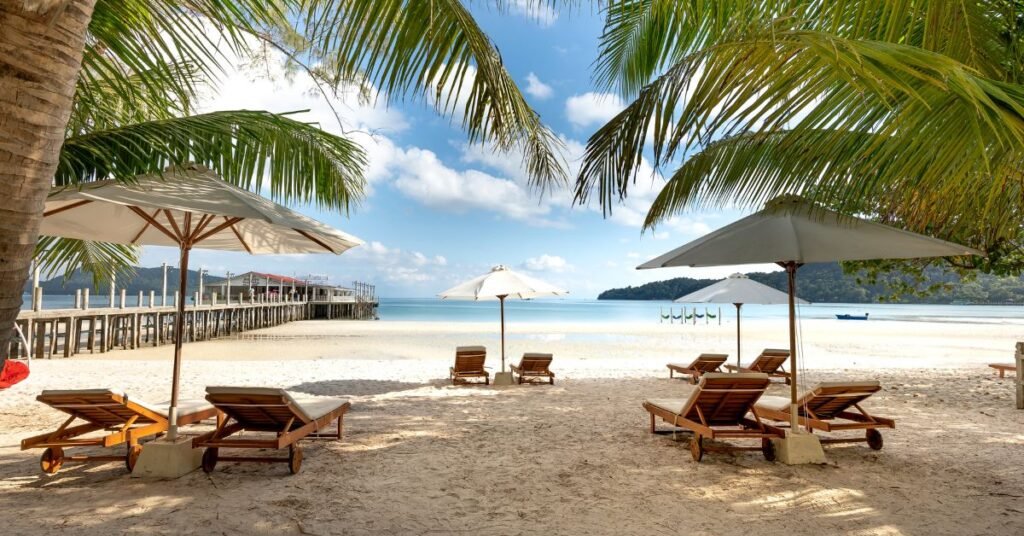
Whitehaven Beach in the Whitsunday Islands is simply paradise on Earth. The sand here is like powder—white, soft, and so pure that it squeaks when you walk on it. I remember pitching my tent and feeling like I had discovered a hidden gem.
The water of Whitehaven Beach is crystal clear, and the shades of blue are mesmerizing. I spent hours swimming, snorkeling, and just soaking in the beauty of it all.
But it’s not just about the aesthetics—there’s something about Whitehaven that makes you feel completely disconnected from the world in the best possible way. It’s so peaceful, and you can go days without seeing another person. Camping here felt like a reset for my mind and soul, and I know I’ll go back for another dose of that tranquility.
Anse Lazio, Seychelles – The Ultimate Tropical Escape
Anse Lazio in the Seychelles is one of those beaches that looks exactly like the postcards—perfect in every way. The golden sand, turquoise waters, and towering palm trees create a picture-perfect setting that’s hard to beat. I camped nearby and spent my days relaxing on the beach, exploring the shallow coral reefs, and hiking through the lush surrounding jungle.
The highlight for me was the sunsets. Watching the sky turn from golden to pink to deep purple over the ocean was breathtaking. I’ve been to many beaches, but Anse Lazio felt like the ultimate tropical escape. The calm and beauty of the place were so captivating that I knew I’d be back, and next time, I’d stay even longer.
Playa de las Catedrales, Spain – A Natural Wonder
Playa de las Catedrales, or “Beach of the Cathedrals,” in Galicia, Spain, is a sight to behold. The first time I camped here, I couldn’t believe the towering rock formations and arches that dominate the coastline. At low tide, you can walk along the beach and through these natural “cathedrals,” and it feels like you’re stepping into another world.
Camping here was an adventure in itself. The beach is remote and wild, but that’s what made it so special. Waking up to the rugged beauty of the cliffs and the sound of waves echoing off the rocks is something I’ll never forget. I can’t wait to return and explore more of this natural wonder, especially with the changing tides revealing new parts of the beach every day.
Coromandel Peninsula, New Zealand – A Dreamy Escape
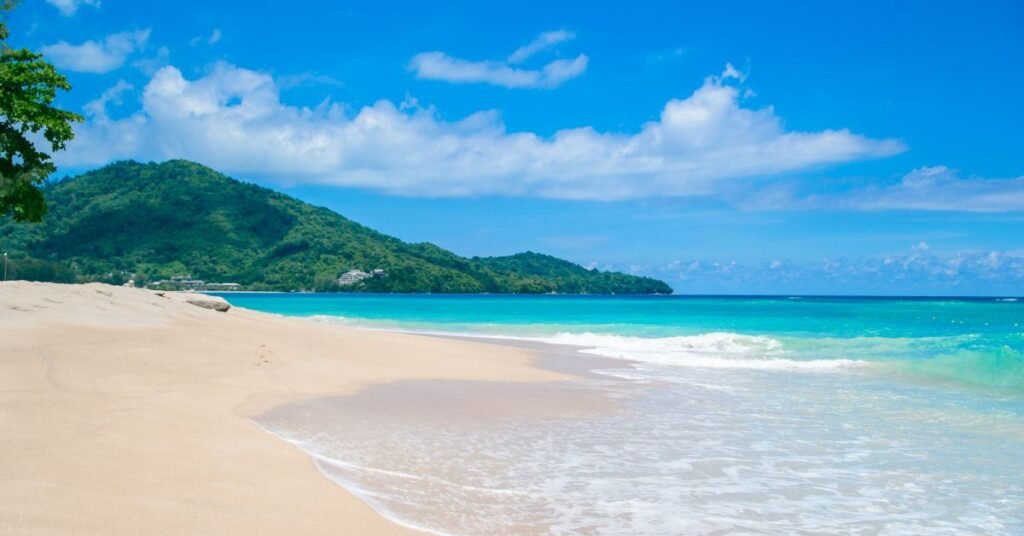
I’ll never forget camping on the Coromandel Peninsula in New Zealand. The beaches here are like something out of a movie—long stretches of golden sand, clear blue water, and lush green mountains in the background. I spent my nights camping under the stars and my days exploring hidden coves, swimming, and kayaking along the coast.
Hot Water Beach was one of the highlights of my trip. Digging my own natural hot spring right in the sand and soaking in the warm water while the ocean waves crashed nearby was an unforgettable experience. There’s just something magical about the Coromandel Peninsula, and every time I think of it, I feel drawn to go back and relive those perfect beach days all over again.
Lanikai Beach, Hawaii – A Tropical Dream
Lanikai Beach on Oahu, Hawaii, is a place I always dream of returning to. The turquoise waters and white sandy shores make it one of the most beautiful beaches I’ve ever camped on. What makes Lanikai so special is the sense of peace you feel the moment you set foot there. The beach is small, but it has a certain charm that makes you feel like you’ve found your own little slice of paradise.
I remember waking up early, watching the sun rise over the Mokulua Islands, and paddling out in a kayak for a closer view. The calm, crystal-clear water was perfect for snorkeling, and I spent hours exploring the vibrant coral reefs and marine life. Lanikai is the kind of beach where time slows down, and I know I’ll be back, soaking up the warm Hawaiian sun and the laid-back vibe once again.
These Beaches Will Always Call Me Back
Each of these beaches left a mark on me, and I can say without hesitation that I’ll return to them all. There’s something about camping on the beach that’s so different from any other type of travel. It’s a mix of adventure, peace, and beauty that stays with you long after you’ve left.
These beaches—Assateague Island, Whitehaven, Anse Lazio, Playa de las Catedrales, the Coromandel Peninsula, and Lanikai Beach—are the kind of places that remind you how beautiful the world is. Every time I visit them, I fall in love with the ocean, the sand, and the simplicity of beach life all over again.
Leave No Trace: Some beach camping etiquette’s?
To preserve the beauty of beaches for future generations and protect the delicate ecosystems, it’s crucial to follow the principles of “Leave No Trace.” Here are some important beach camping etiquettes to help you enjoy your trip while minimizing your environmental impact.
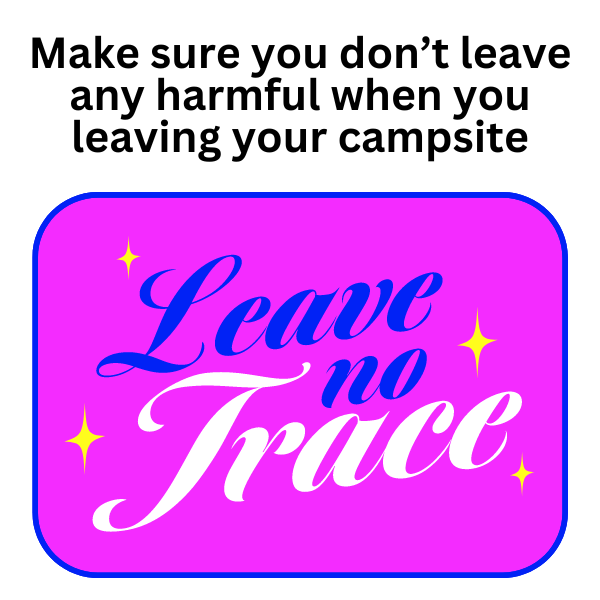
Pack Out All Trash
This one is simple but so important. Whatever you bring with you, be sure to take it back when you leave. Whether it’s food wrappers, bottles, or personal items, ensure that nothing is left behind. Beaches are incredibly sensitive ecosystems, and even small bits of litter can harm wildlife. Bring extra bags to store your trash, and don’t forget to pick up any trash you find, even if it’s not yours. Every little bit helps.
Walking on a beach littered with garbage. It takes away the beauty and magic of the experience, right? Don’t be the person who leaves their mess for someone else.
Respect Wildlife
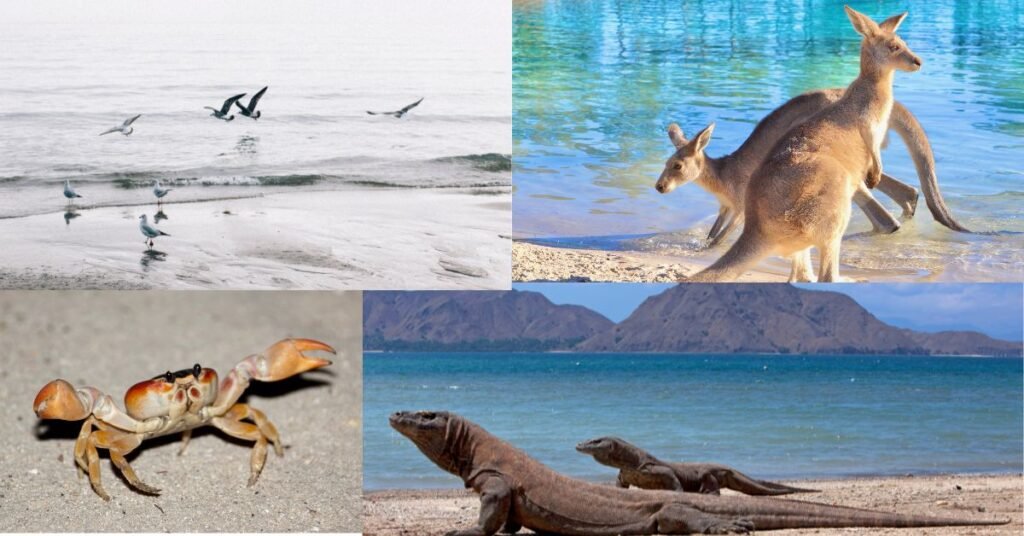
Beaches are home to many species of wildlife, from seabirds to marine animals. When camping, be mindful of your surroundings. Keep a safe distance from any animals you encounter and never attempt to feed them. Feeding wildlife can disrupt their natural behaviors and can be harmful to their health.
Also, be sure to avoid trampling on plants or disturbing nests, particularly if the beach is home to endangered species like sea turtles.
Camp in Designated Areas
While some beaches allow camping, it’s essential to set up your tent in designated areas or zones. This helps protect sensitive sand dunes, plants, and wildlife habitats from being disturbed. If the beach doesn’t have designated camping spots, look for an area that is flat and away from vegetation, and avoid areas where wildlife might be nesting.
Minimize Campfire Impact
There’s nothing like a beach campfire to end the day, but fires can cause lasting damage if not handled properly. Always check if campfires are permitted before starting one. If they are, use established fire pits or create one below the high tide line, where the ocean will naturally erase your fire’s traces. Never burn plastic or other materials that release harmful chemicals into the air. Be sure to fully extinguish the fire before leaving the beach.
Use Biodegradable Soap and Sunscreen
When camping near water, it’s important to use eco-friendly, biodegradable products. Regular soaps and shampoos can introduce harmful chemicals into the ocean or nearby freshwater sources. The same goes for sunscreen—opt for reef-safe sunscreen, especially if you’ll be swimming. This protects marine life and coral reefs from toxic chemicals like oxybenzone and octinoxate.
Respect Quiet Hours and Other Campers
While you may be seeking a fun, adventurous beach camping experience, others may be seeking tranquility. Be respectful of those around you by keeping noise levels down, especially at night. This includes loud music, yelling, or rowdy behavior. The sound of the ocean is often enough to create a peaceful atmosphere, so there’s no need to add any extra noise.
Leave Natural Objects Where They Belong
As tempting as it may be to collect seashells, rocks, or driftwood as souvenirs, it’s important to leave these natural objects in place. They play a vital role in the beach’s ecosystem, providing shelter for animals, nutrients for plants, and contributing to the overall balance of the environment.
Avoid Polluting the Water
If you’re camping close to the ocean, take extra care to avoid contaminating the water. Don’t wash dishes, clothes, or yourself directly in the water. Instead, carry water at least 200 feet away from the ocean or a water source before cleaning up. Dispose of waste properly and avoid dumping any chemicals or food scraps into the water.
Emotionally: Picture the water as the lifeblood of the beach—one that provides for both humans and wildlife. Keeping it clean is not just a rule, it’s a duty to protect life itself.

Leave the Beach Better Than You Found It
Before you leave, do a sweep of your camping area to ensure you haven’t left anything behind. Even better—go beyond and pick up any litter or debris you come across, even if it wasn’t yours. A small effort to clean up can make a big difference for the beach and future campers.
Conclusion
Beach camping can be an unforgettable experience, but it’s essential to understand the local laws before setting up your tent. Whether on public or private land, following the rules ensures you have a safe, legal, and enjoyable time by the ocean. Doing a little research, obtaining permits when needed, and respecting the environment, can lead to enjoying the beauty of beach camping without any unwanted surprises.
So, plan ahead, follow the guidelines, and get ready for a memorable outdoor adventure.
You May Also Like

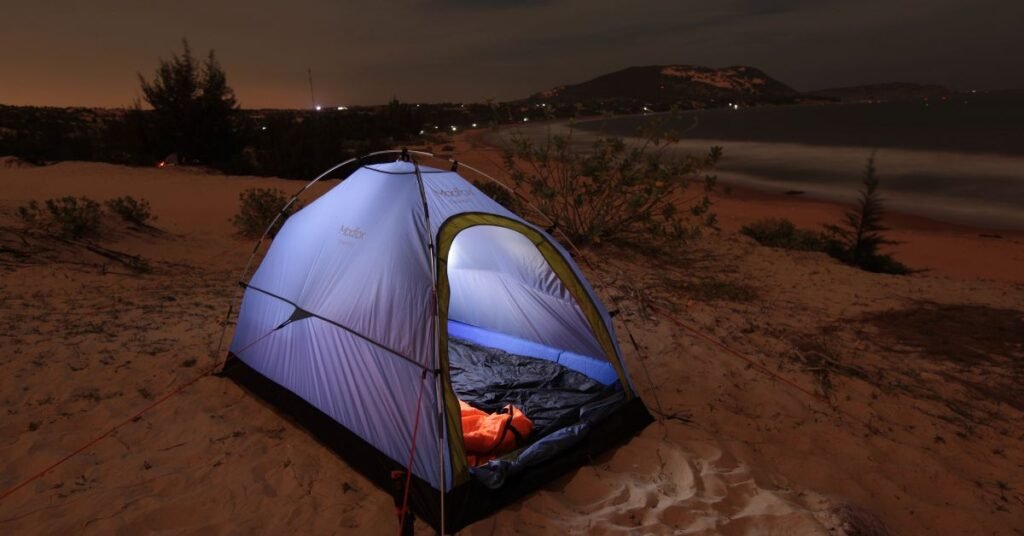
Pingback: How can Beach Camping Reduce the Stress?
Pingback: Can Camping Chairs Be Used At the Beach? - Yes You Can But
Pingback: Simple Tricks to Keep Camping Gears Dry - Rainy Camping
Pingback: Camping with a New Tattoo: Risks, Precaution & Consideration